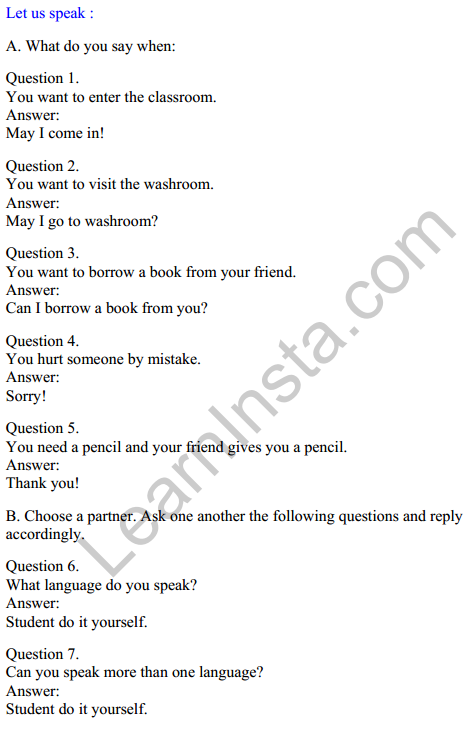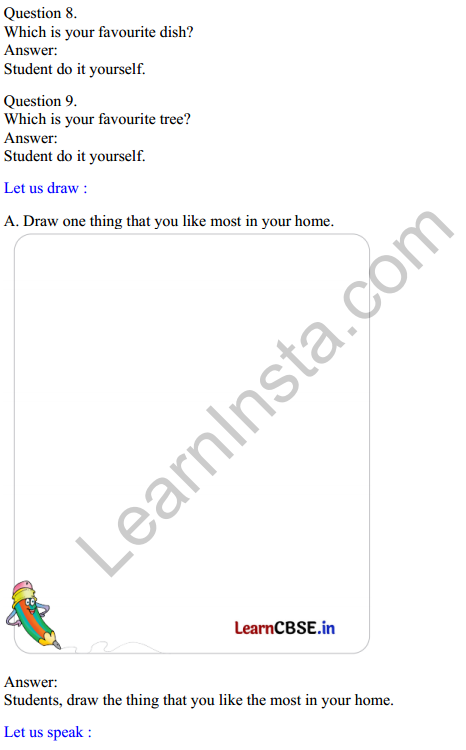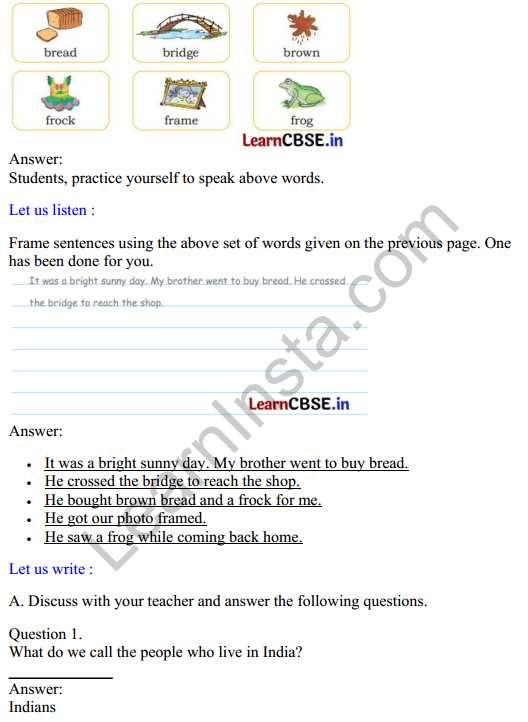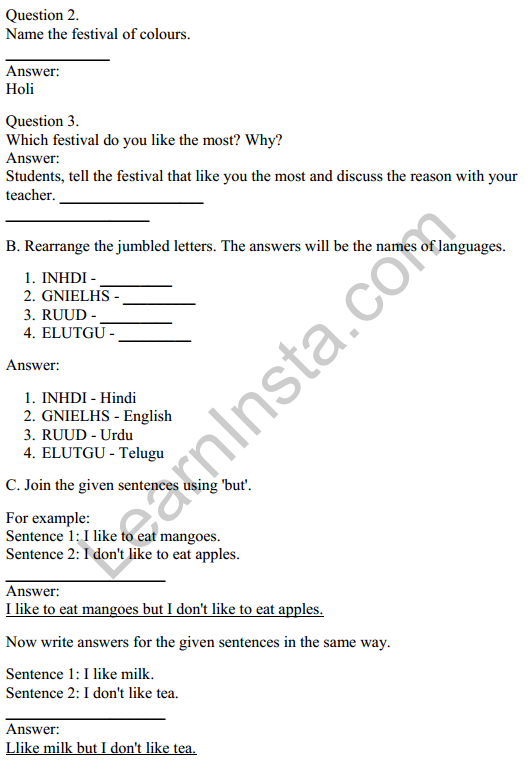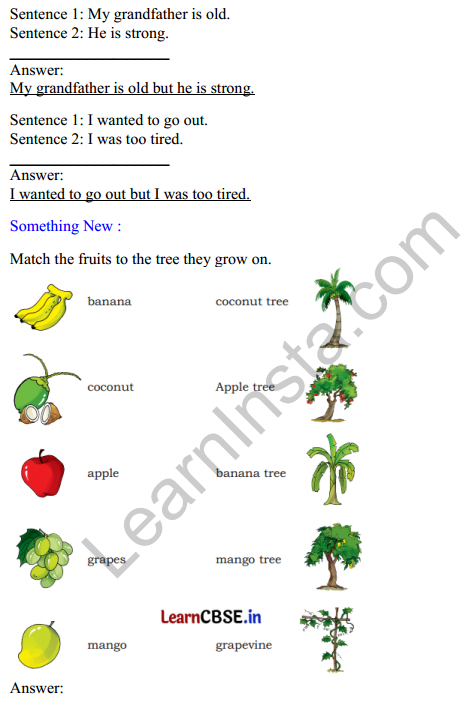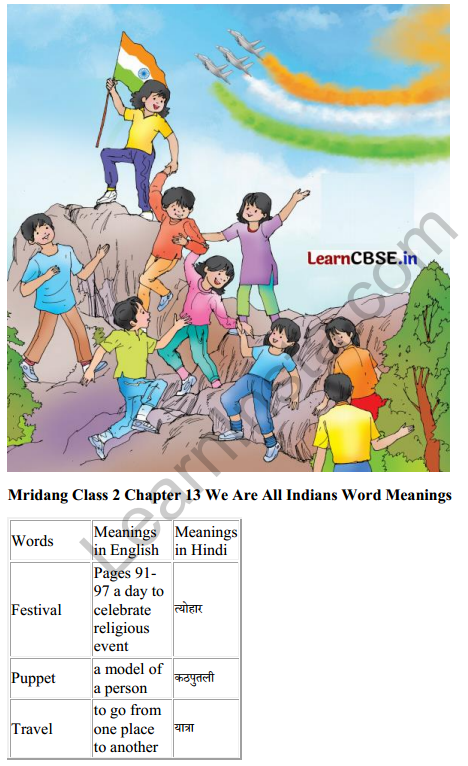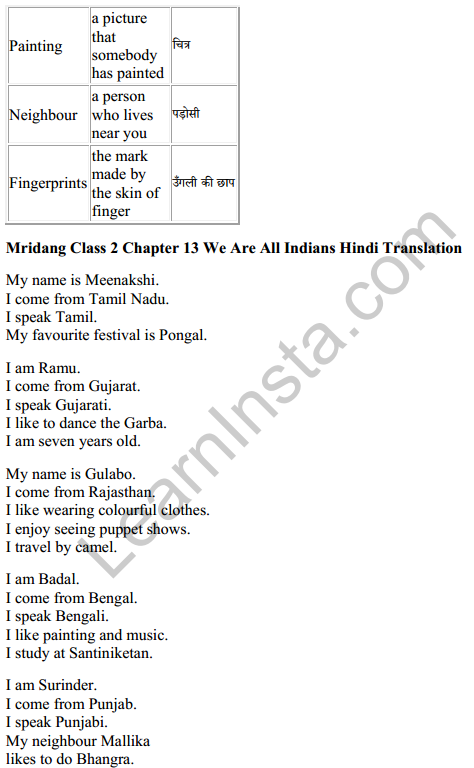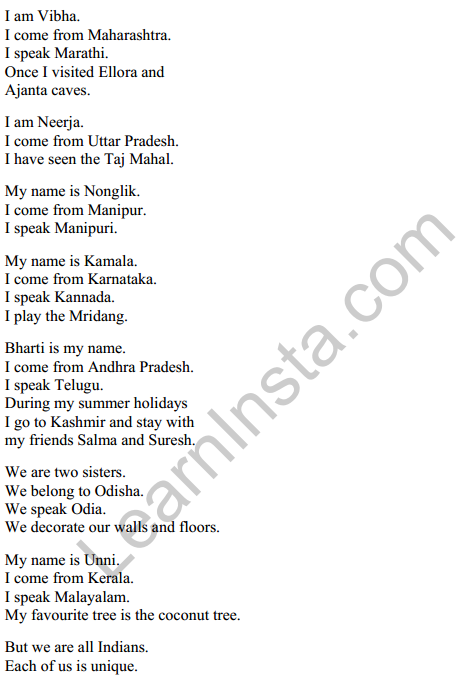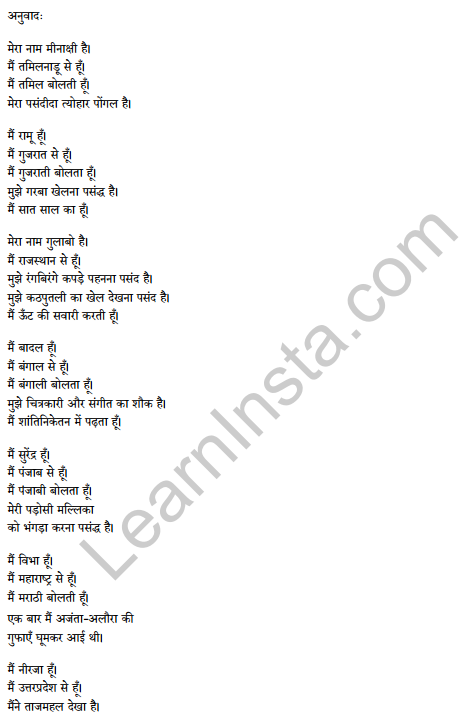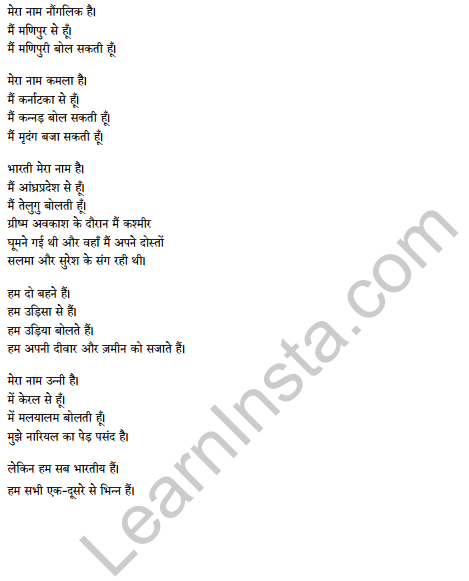Class 2 English Chapter 13 We Are All Indians Question Answer
We Are All Indians Question Answer Class 2
Let us speak
A. What do you say when:
Question 1.
You want to enter the classroom.
Answer:
May I come in?
Question 2.
You want to visit the washroom.
Answer:
May I go to the washroom?
![]()
Question 3.
You want to borrow a book from your friend.
Answer:
May I borrow your book?
Question 4.
You hurt someone by mistake.
Answer:
I am sorry. I hurt you by mistake.
Question 5.
You need a pencil and your friend gives you a pencil.
Answer:
Thank you for giving me a pencil.
B. Choose a partner. Ask one another the following questions and reply accordingly.

Question 6.
What language do you speak?
Answer:
Do it yourself.
Question 7.
Can you speak more than one language?
Answer:
Do it yourself.
Question 8.
Which is your favourite dish?
Answer:
Do it yourself.
![]()
Question 9.
Which is your favourite tree?
Answer:
Do it yourself.
Let us draw
A. Draw one thing that you like most in your home.
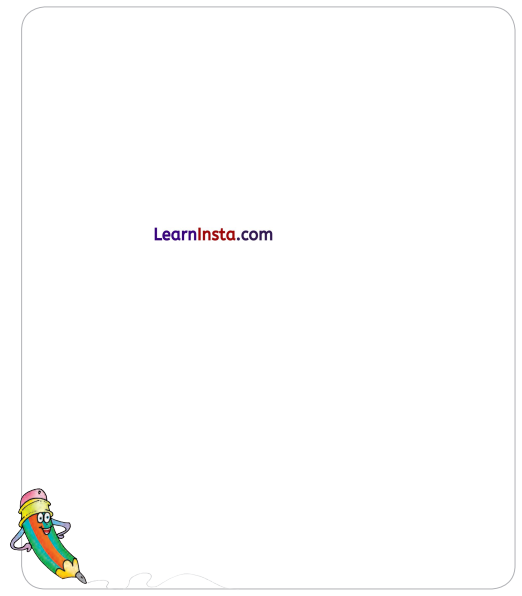
Answer:
Do it yourself.
Let us speak
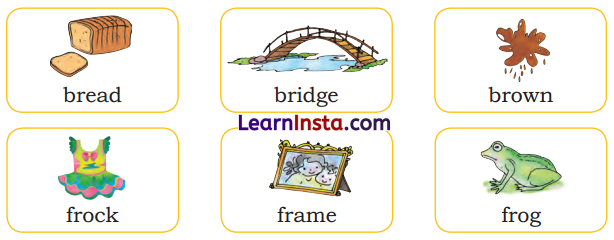
Answer:
Read aloud the words.
Let us listen
Frame sentences using the above set of words given on the previous page. One has been done for you.
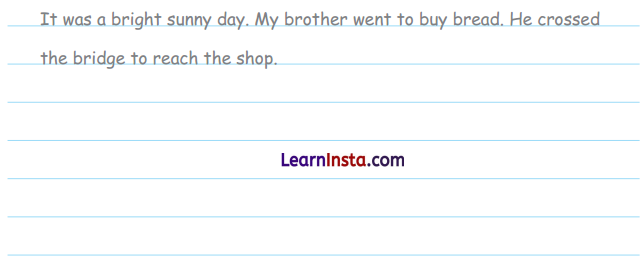
Answer:
Maya went to the market. She bought a frock and a frame. On the way back home, she saw some frogs.
Let us write
A. Discuss with your teacher and answer the following questions.
Question 1.
What do we call the people who live in India?
__________________________________________________
__________________________________________________
Answer:
We call the people who live in India, Indians.
Question 2.
Name the festival of colours.
__________________________________________________
__________________________________________________
Answer:
Holi is the festival of colours.
![]()
Question 3.
Which festival do you like the most? Why?
__________________________________________________
__________________________________________________
Answer:
I like Diwali the most. It is the festival of lights.
B. Rearrange the jumbled letters. The answers will be the names of languages.
- INHDI ____________________
- GNIELHS ____________________
- RUUD ____________________
- ELUTGU ____________________
Answer:
- HINDI
- ENGLISH
- URDU
- TELUGU
C. Join the given sentences using ‘but’.
For example:
Sentence 1: I like to eat mangoes.
Sentence 2: I don’t like to eat apples.
![]()
Now write answers for the given sentences in the same way.
Sentence 1: I like milk.
Sentence 2: I don’t like tea.
_______________________________________________________
_______________________________________________________
Answer:
I like milk but I don’t like tea.
Sentence 1: My grandfather is old.
Sentence 2: He is strong.
_______________________________________________________
_______________________________________________________
Answer:
My grandfather is old but he is strong.
Sentence 1: I wanted to go out.
Sentence 2: I was too tired.
_______________________________________________________
_______________________________________________________
Answer:
I wanted to go out but I was too tired.
We Are All Indians Class 2 Summary
We Are All Indians Class 2 Summary in English
The chapter focuses on regional and national identity, patriotism and togetherness. It aligns with the Indian ethos of ‘Unity in diversity’. It ends with a short play on ‘Charkhs’ and its association with Mahatma Gandhi. It teaches learners about the festivals of various states. Learners will learn about popular languages, cultures, clothes, dances and arts of different states. They also learn about folk music and various musical instruments. Besides, the chapter helps to develop thinking skills and language skills among learners.
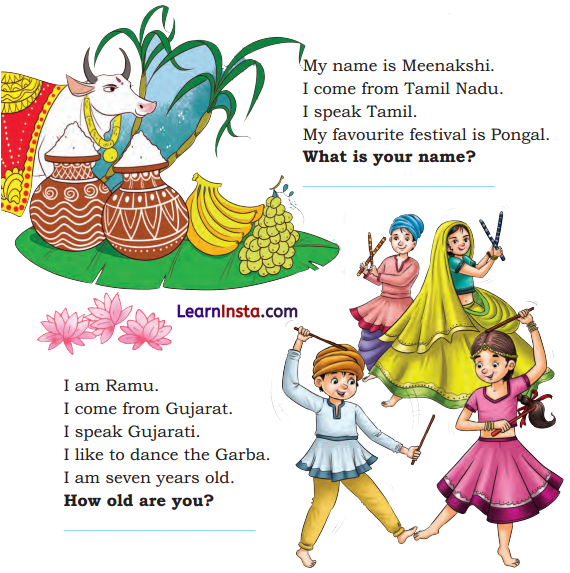
We Are All Indians Class 2 Summary in Hindi
यह अध्याय क्षेत्रीय और राष्ट्रीय अस्मिता, देशमुक्ति और एकजुटता पर केंद्रित है। यह ‘अनेकता में एकता’ के भारतीय लोकाचार के अनुरूप है। यह ‘चरखा’ और महात्मा गाँधी के साथ इसके जुड़ाव पर एक लघु नाटक के साथ समाप्त होता है। यह शिक्षार्थियों को विभिन्न राज्यों के त्योहारों के बारे में बताता है। शिक्षार्थी विभिन्न राज्यों की लोकप्रिय भाषाओं, संस्कृतियों, पहनावे, नृत्यों और कलाओं के बारे में सीखते हैं। वे लोक संगीत और विभिन्न संगीत वाद्ययंत्रों के बारे में भी सीखेंगे। इसके अलावा, यह अध्याय शिक्षार्थियों में चिंतन कौशल और भाषा कौशल विकसित करने में मदद करता है।
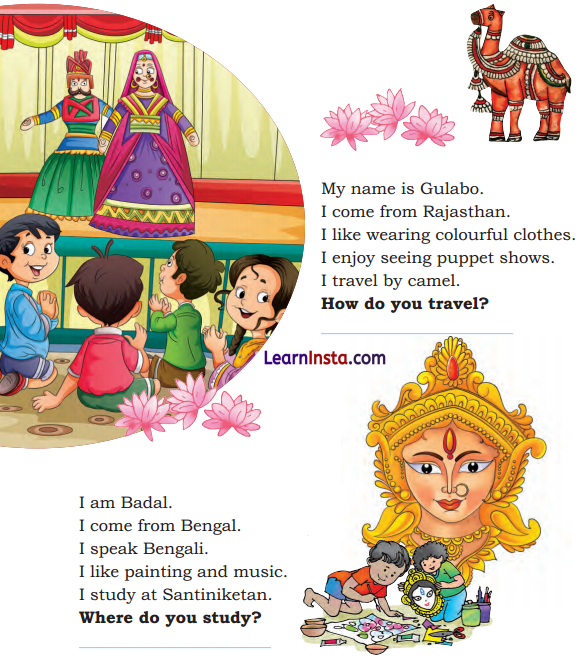
We Are All Indians Class 2 Word Meanings
Let us read
1. My name is Meenakshi.
I come from Tamil Nadu.
I speak Tamil.
My favourite festival is Pongal.
What is your name?
मेरा नाम मीनाक्षी है।
मैं तमिलनाडु से आई हूँ।
मैं तमिल बोलती हूँ।
मेरा पसंदीदा त्योहार पोंगल है।
आपका क्या नाम है?
Word-Meanings:
- Favourite (फ़ेवरिट) – a thing that you like most, एक चीज जो आपको सबसे अधिक पसंद है, पसंदीदा।
- Festival (फेसटिवल) – a day or time that people celebrate, हर्ष एवं उत्साह के साथ मनाया जाने वाला दिन या समय, त्योहार।
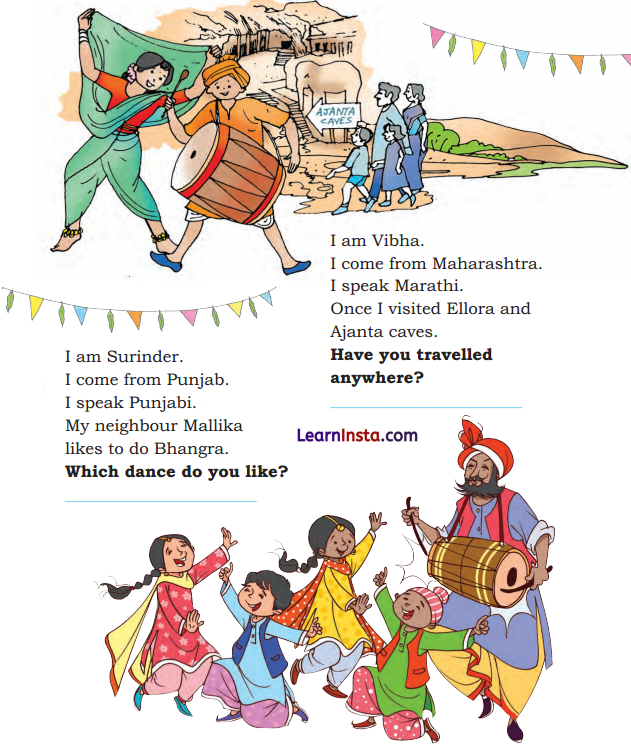
2. I am Ramu.
I come from Gujarat.
I speak Gujarati.
I like to dance the Garba.
I am seven years old.
How old are you?
मैं रामू हूँ।
मैं गुजरात से आया हूँ।
मैं गुजराती बोलता हूँ।
मुझे गरबा डांस करना पसंद है।
मै सात वर्ष का हूँ।
आपकी आयु कितनी है?
Word-Meanings:
- Garba (गरबा) – folk dance of Gujarat, गुजरात का लोक नृत्य।
- Old (ऑल्ड) – of a particular age, किसी विशेष उम्र का प्राचीन।
![]()
3. My name is Gulabo.
I come from Rajasthan.
I like wearing colourful clothes.
I enjoy seeing puppet shows.
I travel by camel.
How do you travel?
मेरा नाम गुलाबो है।
मैं राजस्थान से आई हूँ।
मुझे रंग-बिरंगे कपड़े पहनना पसंद है।
मुझे कठपुतली शो देखने में मजा आता है।
मैं ऊँट से यात्रा करती हूँ।
आप कैसे यात्रा करते हैं?
Word-Meanings:
- Puppet (पॉपिट) – a model of a person or an animal that can be made to move, किसी व्यक्ति या जानवर का एक मॉडल जिसे चलाया जा सकता है, कठपुतली।
- Show (शो) – a type of entertainment performed for an audience, दर्शकों के मनोरंजन के लिए पस्तुत कार्यक्रम।
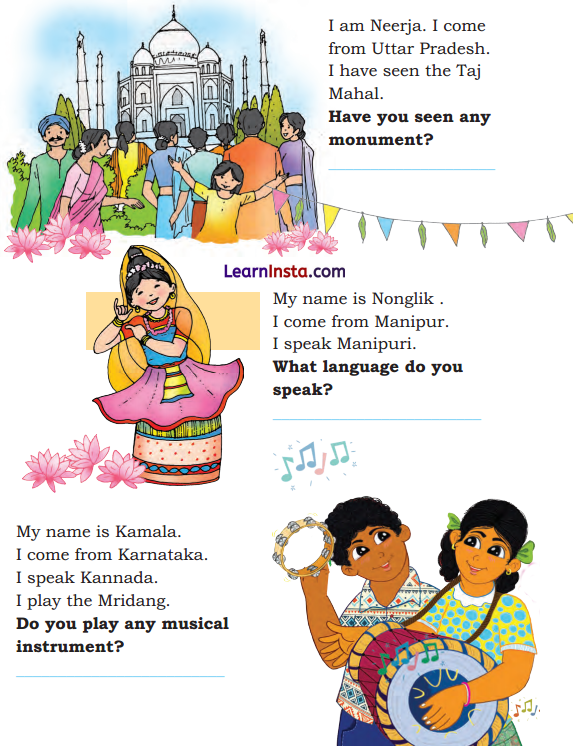
4. I am Badal.
I came from Bengal.
I speak Bengali.
I like painting and music.
I study at Santiniketan.
Where do you study?
मैं बादल हूँ।
मैं बँगाल से आया हूँ।
मैं बांग्ला बोलता हूँ।
मुझे पेंटिंग और संगीत पसंद है।
मैं शांतिनिकेतन में पढ़ता हूँ।
आप कहाँ पढ़ते हैं?
Word-Meanings:
- Bengali (बँगाली) – language that people of Bengal speak, वह भाषा जो बंगाल के लोग बोलते हैं।
5. I am Vibha.
I come from Maharashtra.
I speak Marathi.
Once I visited Ellora and Ajanta caves.
Have you travelled anywhere?
मैं विभा हूँ।
मैं महाराष्ट्र से आई हूँ।
मैं मराठी बोलता हूँ।
एक बार मैं एलोरा और अजंता की गुफाएँ देखने गयी थी।
क्या आपने कहीं यात्रा की है?
Word Meanings:
- Marathi (मराठी) – language spoken in Maharashtra, महाराष्ट्र में बोली जाने वाली भाषा, मराठी।
- Cave (केव) – a large hole inside of a hill, किसी पहाड़ी के अंदर एक बड़ा सुरंग, गुफा।
6. I am Surinder.
I come from Punjab.
I speak Punjabi.
My neighbour Mallika
likes to do Bhangra.
Which dance do you like?
मैं सुरिंदर हूँ।
मैं पंजाब से आया हूँ।
मैं पंजाबी बोलता हूँ।
मेरी पड़ोसन मल्लिका को
भांगड़ा करना पसंद है।
आपको कौन सा नृत्य पसंद है?
Word-Meanings:
- Punjabi (पंजाबी) – language spoken in Punjab, पंजाब में बोली जाने वाली भाषा, पंजाबी।
- Neighbour (नेबर) – a person who lives near you, वह व्यक्ति जो आपके निकट रहता है, पड़ोसी।
- Bhangra (भांगडा) – folk dance of Punjab, पंजाब का लोक नृत्य, भांगडा।

7. I am Neerja.
I come from Uttar Pradesh.
I have seen the Taj Mahal.
Have you seen any monument?
मैं नीरजा हूँ।
मैं उत्तर प्रदेश से आई हूँ।
मैंने ताजमहल देखा है।
क्या आपने कोई स्मारक देखा है?
Word Meanings:
- Monument (मान्युमन्ट) – a building to remind of famous people or event, प्रसिद्ध लोगों या घटना को याद दिलाने वाली इमारत, स्मारक।
![]()
8. My name is Nonglik.
I come from Manipur.
I speak Manipuri.
What language do you speak?
मेरा नाम नोंग्लिक है।
मैं मणिपुर से आया हूँ।
मैं मणिपुरी बोलता हूँ।
आप कौन-सी भाषा बोलते हैं?
Word Meanings:
- Manipuri (मणिपुरी) – the language the people of Manipur speak, मणिपुर के लोगों द्वारा बोली जाने वाली भाषा।
9. My name is Kamala.
I come from Karnataka.
I speak Kannada.
I play the Mridang.
Do you play any musical instrument?
मेरा नाम कमला है।
मैं कर्नाटक से आई हूँ।
मैं कन्नड़ बोलती हूँ।
मैं मृदंग बजाती हूँ।
क्या आप कोई वाद्य यंत्र बजा लेते हैं?
Word Meanings:
- Mridang (मृदंग) – a type of drum, एक प्रकार का डोल (वाद्य यंत्र)।
- Instrument (इन्सट्मैन्ट) – something used to play music, वादयंत्र।
- Kannada (कन्नड) – the language the people of Karnataka speak, कन्नड वह भाषा है, जो कर्नाटक के लोग बोलते हैं।
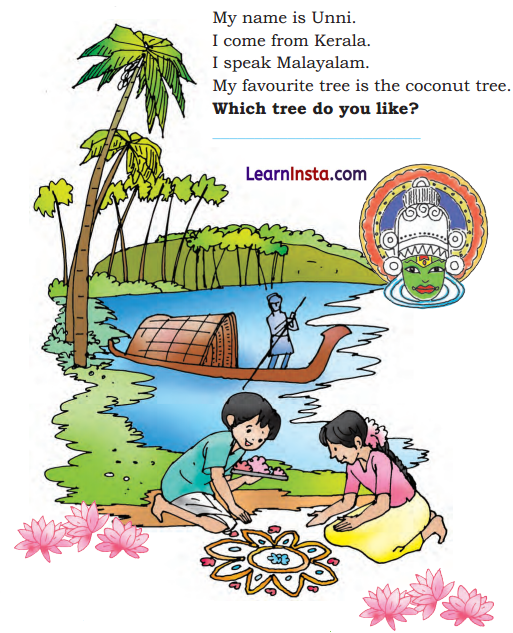
10. Bharti is my name.
I come from Andhra Pradesh.
I speak Telugu.
During my summer holidays
I go to Kashmir
And stay with my friends
Salma and Suresh.
Where do you go for your holidays?
मेरा नाम भारती है।
मैं आंध्र प्रदेश से आई हूँ।
मैं तेलुगु बोलती हूँ।
अपनी गरमी की छुट्टियों के दौरान
मैं कश्मीर जाती हूँ और अपने
दोस्तों-सलमा और सुरेश के साथ
रूकती हूँ।
आप अपनी छुट्टियाँ बिताने कहाँ जाते हैं?
Word Meanings:
- Telugu (तेलुगु) – the language the people Andhra Pradesh speak, तेलुगु वह भाषा है, जो आंध्र प्रदेश के लोग बोलते हैं।
- Holidays (होलिडे) – a day of rest when people have no work to do, आराम का दिन जब लोगों के पास कोई काम नहीं होता।
- Stay (स्टे) – to continue to be in a particular place, किसी विशेष स्थान पर बने रहना।
11. We are two sisters.
We belong to Odisha.
We speak Odia.
We decorate our walls and floors.
Do you have a sister or a brother?
हम दो बहनें हैं।
हम ओडिशा की रहने वाली हैं।
हम उड़िया बोलती हैं।
हम अपनी दीवारों और फ़शों को सजाती हैं।
क्या आपकी कोई बहन या भाई है?
Word Meanings:
- Odia (उड़िया) – the language the people Odisha speak, उड़ीसा के लोग जो भाषा बोलते हैं।
- Decorate (डिकोरेट) – to make something more beautiful by putting things on it, किसी वस्तु पर और चीज़े डालकर सजाना।
- Floor (फलोर) – the surface of a room on which you walk, कमरे की वह सतह, जिस पर आप चलते हैं, फ़र्श।
![]()
12. My name is Unni.
I come from Kerala.
I speak Malayalam.
My favourite tree is the coconut tree.
Which tree do you like?
मेरा नाम उन्नी है।
मैं केरल से आई हूँ।
मैं मलयालम बोलती हूँ।
मेरा पसंदीदा पेड़ नारियल का पेड़ है।
आपको कौन-सा पेड पसंद है?
Word Meanings:
- Malayalam (मलयालम) – language spoken in Kerala, केरल में बोली जाने वाली भाषा।
- Coconut (कोकोनट) – a large tropical fruit with a hard and hairy shell, कड़ा और बालों वाला एक उष्णकटिबंधीय फल।
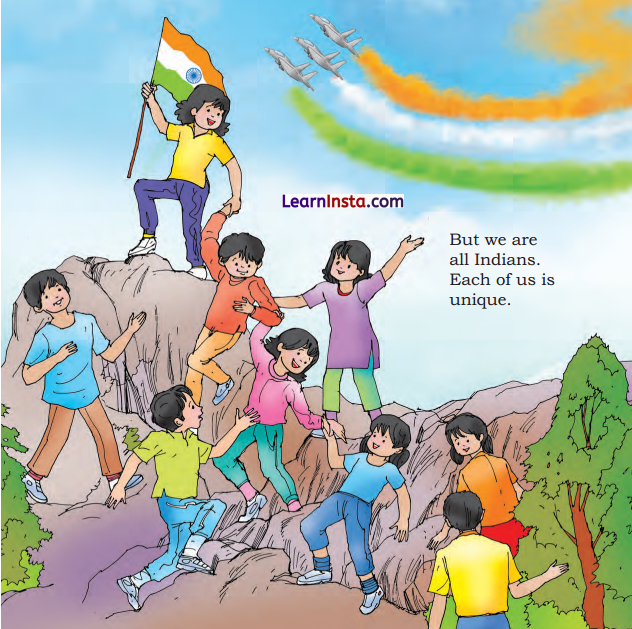
13. But we are all Indians.
Each of us is unique.
लेकिन हम सभी भारतीय हैं।
हममें से प्रत्येक निराला है।
Word-Meanings:
- Indians (इंडियन्स) – people of India, भारतीय।
- Unique (यूनीक) – being the only one of its type, अपनी तरह का अकेला।
We Are All Indians Class 2 Questions and Answers
